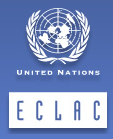The UN Economic Commission for Latin America and the Caribbean's (ECLAC) Ad Hoc Committee on Population and Development adopted agreements stressing the need for policies for sustainable urban development, addressing territorial inequalities, promoting energy efficiency and addressing impacts of climate change.
 6 July 2012: The 2012 session of the UN Economic Commission for Latin America and the Caribbean’s (ECLAC) Ad Hoc Committee on Population and Development adopted agreements stressing the importance of policies to reduce territorial inequalities for sustainable development.
6 July 2012: The 2012 session of the UN Economic Commission for Latin America and the Caribbean’s (ECLAC) Ad Hoc Committee on Population and Development adopted agreements stressing the importance of policies to reduce territorial inequalities for sustainable development.
The Committee met from 4-6 July 2012, in Quito, Ecuador, under the theme of “population, territory and sustainable development.”
In its set of agreements, delegates urged member States to improve their sustainable development policies, foster energy efficiency and address the impacts of climate change, bearing in mind the outcomes of the UN Conference on Sustainable Development (UNCSD, or Rio+20) with a view to facilitating its implementation. They urged governments to formulate urban development strategies that include territorial planning and environmental sustainability in order to promote sustainable urban growth and strengthen cities of all sizes.
Delegates further stressed the importance of territory as a key element in sustainable development and to reduce territorial inequalities. They encouraged member States to adopt active territorial policies “inspired by a vision of sustainable development” that reduce asymmetries between urban and rural areas, among small, intermediate an large cities, and between isolated populations and those that live in small rural settlements.
Delegates appealed to member States to uphold and build upon the achievements of the 1994 Programme of Action of the International Conference on Population and Development, as well as the targets of the Millennium Development Goals (MDGs), particularly those referring to guaranteeing reproductive rights and universal access to sexual and reproductive health, and provision of comprehensive maternal health services. They urged member States to ensure accountability about MDGs fulfillment relating to women’s and children’s health, and affirmed the importance of sufficient resources from governments and UN agencies, fund and programmes to speed up implementation of the Cairo Programme of Action. They called on the UN Population Fund (UNFPA) to provide the necessary technical support to Latin America and the Caribbean (LAC) countries to contribute to the regional report for the 20-year review of Cairo Programme implementation.
Delegates also agreed to convert the Committee into a more autonomous Regional Conference on Population and Development in LAC, whose decisions can be considered at the biennial ECLAC Sessions, the top policy-setting body of the Commission, as well as by the UN Economic and Social Council (ECOSOC). They agreed that the first meeting of the Regional Conference would be held in Uruguay in the second half of 2013, and will focus on the Cairo Programme of Action beyond 2014. [ECLAC Press Release] [Publication: 2012 Committee Agreements]